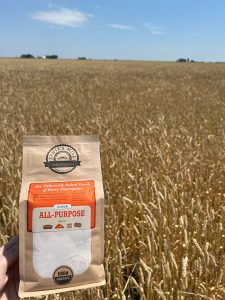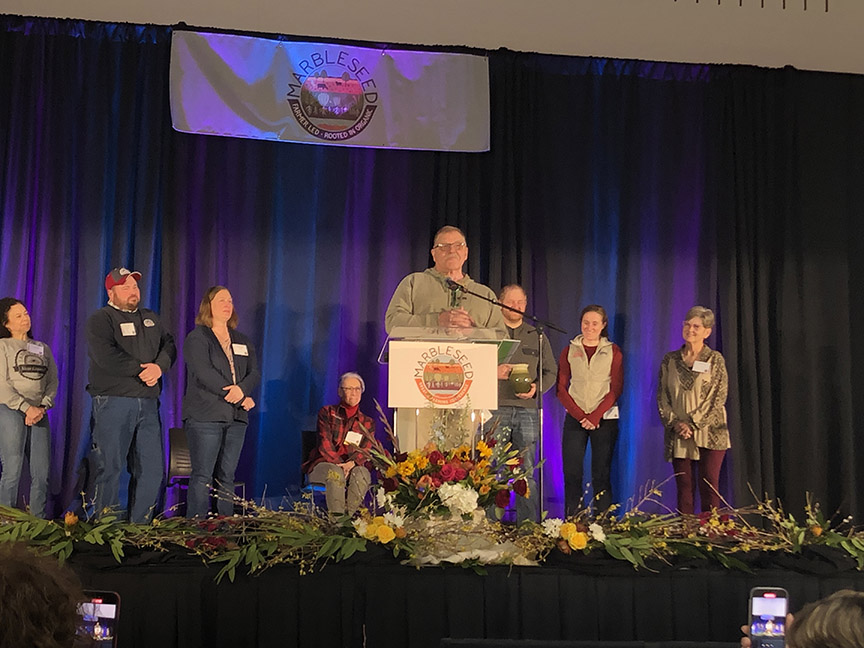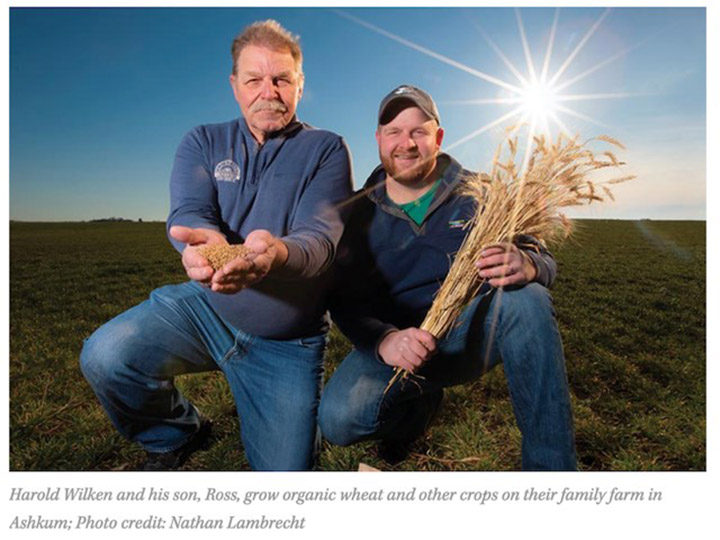Janie’s Farm Organics provides “guiding north star” for organic success
Life sometimes works in mysterious ways and can even guide us in the right direction. Take Harold Wilken, an organic farmer in Danforth, Illinois. While farming conventionally, Wilken had bad experiences with pesticides—a common experience of conventional farmers. In 1992, he was accidently sprayed with the herbicide Dual that may have led to health problems, and he got headaches that would “last for days” from using another herbicide, Treflan.
Bad effects from pesticides plus another event led Wilken to transition his farm to organic. In 2001, his oldest child, Janie, was tragically killed in a car accident at age 15. In a condolence letter, his neighbor, Herman Brockman, offered Wilken the opportunity to farm his neighboring land organically. Wilken took the opportunity and has never looked back.
Today, Janie’s Farm Organic , named after Janie Wilken, is a thriving, successful organic farm encompassing 3,300 acres and growing a range of organic crops in Danforth, Illinois. Another business, Janie’s Mill , mills crops such as wheat and corn into flour and sells them wholesale to bakers and distillers and retail to consumers.
“We are producing foods that are good for human health”
Wilken completed the transition to organic in 2005. “I say the land really doesn’t become organic or alive again, totally, until five years,” he says.
Farming organically, gave Wilken the satisfaction “of knowing that we aren’t relying on unhealthy soil amendments and we are producing foods that are good for human health.”
Janie’s Farm grows organic corn, soybeans, wheat, and ancient grains.
“We’ve got a diversified portfolio of corn,” Wilken says. These include yellow and white varieties as well as specialty, heirloom corns such as bloody butcher.
Wheat varieties include hard red spring, soft red winter, hard red winter, soft winter, and turkey red. Production of different wheats varies each year. The farm also grows rye, and Wilken plans to add oats to his organic rotation.
Soybeans are sold to food processors who make soy foods and the organic feed market.
Most of the land farmed by Wilken and his team—2,900 acres—is rented from 24 landowners. Wilken says the landowners benefit from the organic production.
“We offer landowners a different type of agriculture that matches their lifestyle.”
Janie’s Farm also contracts with farmers in other states to grow organic grains. An organic farmer in Nebraska grows einkorn and red fife wheat ancient wheats. A farmer in Michigan grows organic spelt. A farmer in Montana supplies organic durum wheat, and another in Minnesota grows organic spring wheat.
“We’ve got a network of growers that we work with,” Wilken says.
Building soil health
Janie’s Farm grows cover crops such as red clover and rye to help build soil health.
“We take none of the cover crops off, everything goes back into the soil,” Wilken says.
Janie’s Farm does till the soil, a practice that organic farmers have been criticized for because it releases carbon into the atmosphere and can lead to erosion. But Wilken says they have no problems with soil erosion.
“Most everything (tillage) we do is in the top four inches of the soil, which is the aerobic zone,” Wilken says. “I call what we do compost farming because you’re using the air, the moisture, and the soil to break down the residue and nutrients from the previous crops.”
He would like to reduce tillage or even switch to no-till but says: “We do not yet see a (low- or no-till) system that is consistent for producing food-grade organic grains.”
A study conducted by the Rodale Institute and Basil’s Harvest , a non-profit organization focused on building regenerative food systems, found that one of Janie’s Farm Organics farms had a soil organic matter level of 5.0%, while another had a level of 3.8%. Soil organic matter is a key measure of soil health, and levels of 3%-6% are considered optimal.

Janie’s Mill All-Purpose Flour
Janie’s Mill
Seeing the opportunity to sell value-added products from the farm, Wilken launched Janie’s Mill in 2017. The mill supplies whole kernel flours ranging from specialty heirloom flours like Turkey Red, to artisan bread flours and all-purpose and pastry flours.
Janie’s Mill sells the flours wholesale to other grain millers and distillers who make whiskey and vodka.
They also have a line of retail flour products that are sold in food co-ops and bakeries.
During the Covid pandemic the retail business boomed. “We went from five orders a day average to a high of 568 in one day,” Wilken says
The mill produces between 5,000 and 7,000 pounds of flour per day.
Janie’s Mill sells its flour products online to retail customers nationwide, primarily those in Illinois with others in Florida, Tennessee, and New York. Wholesale customers are in a five-hour driving radius of the mill.
Wilken says distilleries are becoming a bigger part of their market, and that’s because they want non-GMO grains.
“They know that if they buy organic grains, there are no GMOs and no pesticides.”
Wilken says they test their corn for GMOs, using the protein-based strip test or the lab-based PCR test.
“We have distillers that want to know if there are GMOs in the corn. “We won’t sell a food-grade product that has GMOs in it.”
Fortunately, they haven’t had any major problems with GMO contamination.
Janie’s Mill is also supplying flaked oats to two hospitals in Illinois: St. Francis Medical Center in Peoria and St. James Hospital in Pontiac. Erin Meyer, executive director of Basil’s Harvest, helped facilitate the connection between Janie’s Mill and the hospitals.
“Harold and his family ‘walk the talk,’” Meyer says. “They are good stewards of the land, a guiding north star. I feel very lucky to be working with them.”
“We were able to make this system work”
Janie’s Farm Organics is a family business. Harold’s son Ross is co-owner and manager. Harold’s nephew, Tim Vaske, works with Ross to manage the farm and has his own grass-fed beef business.
“Probably the most important thing to me is that I’ve been able to bring the next generation in, my son and nephew,” Wilken says.
Janie’s Farm and Mill also employs people in the local community. A neighbor, Ryan Wolfe, works on the farm after transitioning his own farm to organic. Herman Brockman’s daughter, Jill Brockman-Cummings, manages the mill. The mill has 23 employees. The farm has six full-time and four part-time employees. The part-time employees are local high school students who work on the farm after school and during the summer.
“The best way to have good organic employees is to train them from a young age,” Wilken says.
Inspiring the next generations to farm organically is a “deep down goal” of Wilkens. “Who knows how many other of these young people will at some point take what they’ve learned with us and take it to the level of being an organic farmer,” he says.
After farming organically for more than 20 years, Wilken feels like he has succeeded. “We were able to make this system work,” he says. “We’ve also had an effect on other farmers, mentoring other farmers who’ve gone on and done well in organics.”
Wilken was recently honored as Organic Farmer of the Year at the 2023 Marbleseed Organic Farming Conference in February.
As for the future, Wilken say he wants to “continue developing markets and to inspire more organic farmers.”

Harold Wilken was honored as Organic Farmer of the Year at the Marbleseed Organic Farming Conference in February





